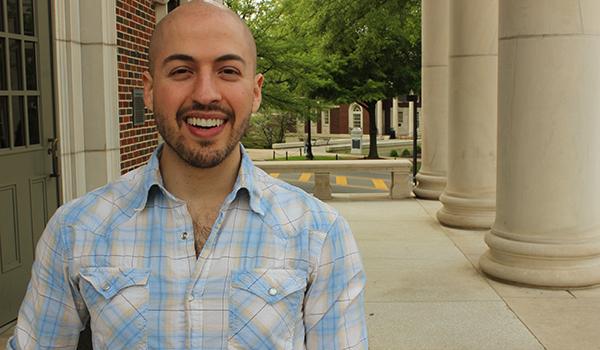Chicotsky, a doctoral student in the College of Communication and Information Sciences, uses the controversial, decentralized online currency to pay for his living expenses through his website, Bitcoin PhD.
According to the Institute for College Access and Success, 69 percent of college students at public and private nonprofit colleges had student loans in 2013. These students had an average of $28,400 in student debt. The national total reached $1.2 trillion in 2013, according to the Consumer Financial Protection Bureau. Chicotsky said he believes the best way out of this crisis is to reject the financial institutions that land students there in the first place.
“After the 2008 market crash, I had just entered the job market as a graduate from the University of Texas,” he said. “Oddly, banks were still willing to lend out money to students.”
Plagued by high interest rates after graduating from NYU, Chicotsky turned to his community to get out of debt. He paid off the loans completely through crowdsourcing, or accepting donations from individual backers, frequently done over the Internet. Through Upstart, an online peer-lending website, Chicotsky found supporters in friends, family and even executives, like a vice president of Google.
“Half [of the debt] was cleared through Upstart, and the other half I decided to clear through Bitcoin,” Chicotsky said. “Bitcoin PhD is the new iteration of what has already worked for me in the past.”
Chicotsky learned about the currency through family members who mine, or produce, Bitcoin, and through Reddit forums. He said the currency is relevant to his generation’s legacy, making it historical – almost a novelty – for donors.
“For digital natives, this is a trading asset and a trading market that, in many ways, could define our era online,” he said.
Chictosky’s colleague from the University of Texas, Will Roman, founded Humble WP, a service that builds WordPress sites for small businesses. Roman said he sees Bitcoin as the catalyst for change in the global financial system through its block chain system, or the open process of verification that removes the need for government and bank regulation.
“It almost takes us back to a pre-institutional environment, where the reason this particular currency has value is that we all agree it has value,” Roman said. “The power of determining how legitimate it is comes from all of us, and that’s the block chain idea.”
While traditional banks keep ledgers of their users’ accounts, Bitcoin ledgers are distributed across networks around the world. Computers everywhere work together to verify purchases made with Bitcoin, according to Blockchain Info.
“One reason it’s gotten a lot of resistance from traditional institutions is it possesses the potential to render them needless for economic transaction,” Roman said.
Naveed Lalani, Chicotsky’s peer and CEO of Portable Boutique, develops widgets that allow merchants to accept Bitcoin payments.
“What got me excited was when I heard about the negative mindset around Bitcoin,” he said. “Once I started digging a little bit to see what potential entrepreneurship opportunities were out there, I saw that it was an actual legitimate technology that’s really interesting and could be really innovative.”
Lalani’s widgets allow business owners and other fundraisers like Chicotsky to implement Bitcoin in their moneymaking efforts.
While the startup and tech world is under fire for excluding women and minorities, Lalani said the Bitcoin industry is focused on adoption and is more receptive to all individuals who want to take part.
“It is a very open, creative community,” he said. “There’s still a nerd space in Bitcoin, but there’s a focus in the community that we’re looking for all sorts of people to get involved.”
Chicotsky encourages other students to look at Bitcoin and crowdsourcing as solutions to their debt. Chicotsky said he was one of the first in the world to crowdsource Bitcoin for school, giving his campaign an edge, but he sees promise for future campaigns.
“I think people will have success if they’re good marketers that brand themselves well, and they believe in Bitcoin and teach others about it,” he said.
The Bitcoin PhD website also offers information and resources for interested students. Chicotsky also donates part of his donations to the Project on Student Debt, a nonprofit effort to make school more affordable through research and policy.
Chicotsky will continue his fundraising until he completes his doctorate degree, he said. His research centers around building media fame, which he said had a reciprocal effect on helping him raise money for school.
For the future of Bitcoin, Chicotsky, Roman and Lalani see increased adoption, through online wallets like Coinbase and CoinDesk. Lalani said the blockchain that facilitates Bitcoin transactions could also transport contracts, purchases and secret information.
“Adoption is going to happen quietly where you might not even know that you’re using it,” Lalani said. “You’ll just sign a contract.”
When asked if crowdsourcing Bitcoin affected his research and education, Chicotsky attested to its positive effect on academics for himself and any future users.
“Absolutely, unequivocally, undeniably, undoubtedly yes,” he said. “Financial freedom is important for anyone who is trying to contribute to science and discovery.”









